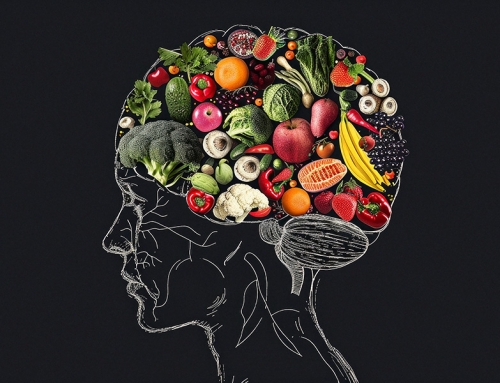Eating is more than just eating; it influences our social interactions, emotional states, and even brain function. If you’ve ever found yourself mindlessly eating snacks in front of the TV after a bad day, or you instantly felt better on having a fresh bowl of fruit, it is because our food choices can mentally and emotionally impact on our moods, and vice versa. This bidirectional relationship between food and our mood is mind boggling (1).
The connection between nutrition and mental health has received a lot of attention in recent years. Improving one’s diet may help protect not only one’s physical health but also their mental health. Poor nutrition may be a contributing factor in the consistent experience of low mood (2).
Mood’s Impact on Food Choice
Moods are long-lasting emotional states that we experience. Changes in food preferences or choices in response to our temporary psychological state, such as “comfort foods” in times of depression or changes in appetite due to stress, are common human experiences (2). Our moods can influence our food choices in a variety of ways. As a result, when we are stressed or in a generally bad mood, we tend to seek out foods that give us pleasure. Personal preferences will vary, but many people enjoy processed foods with lower nutrient density (3).
Food’s Impact on Mood
At the same time, the foods that we choose to put into our bodies can have significant impacts on our mood. Thankfully, we can use this to naturally combat certain moods and help treat mental health concerns. Let us look at how nutrients affect the mood.
Protein
According to research, people who eat a high-protein diet have lower levels of negative mood than those who eat a low-protein diet. Protein has also been linked to higher levels of dopamine and norepinephrine, two brain chemicals that play important roles. Tryptophan, an amino acid and a precursor of serotonin, is found in protein-rich foods. Serotonin, which regulates your mood in your brain, is often referred to as the body’s natural “feel-good” chemical (3).
Carbohydrate
The glycemic index is a relative ranking of carbohydrates in foods based on how quickly they are digested, absorbed, metabolized, and thus affect blood glucose and insulin levels. In addition to the physical health risks, diets with a high glycemic index and load may have a negative impact on psychological well-being. A high glycemic load in the diet and the compensatory decline in blood glucose levels stimulate the secretion of autonomic counter-regulatory hormones such as glucagon, cortisol, adrenaline, growth hormone, and glucagon. Changes in anxiety, irritability, and hunger may result from such counter-regulatory hormones. Furthermore, observational research has discovered that recurrent hypoglycemia (low blood sugar) is linked to mood disorders. Also, consumption of a high-GI diet was associated with elevated levels of inflammation, which in turn has been linked with depressive symptoms (4).
Dietary fat
Fats are actually necessary for the nervous system, particularly the brain. Fats help to support the brain’s ability to function and help with the production of certain neurotransmitters involved in our moods. People who significantly reduce their dietary fat levels have been shown to have significantly higher levels of rage and depression (5). One type of unsaturated fat, omega-3 fatty acids, aids in the treatment of anxiety and depression. People with anxiety and depression disorders have lower levels of omega-3 fatty acids in their blood than those who do not have these disorders. (6).
Micronutrients
Micronutrient deficiencies have been linked to lower mood. Multiple nutrients are responsible for psychological well being. Thiamine, iron, and magnesium have been shown in studies to help with anxiety and muscle relaxation. Folate-rich foods have been shown to help prevent depression symptoms. According to one study, women who ate more vitamin D-rich foods had a lower risk of depression than women who ate vitamin D-deficient diets (7). Together with folate, vitamin B12 aids in the conversion of amino acids into neurotransmitters. Depression patients were found to have lower levels of both (8).
Consumption of both macro and micronutrients is vital for our stable mood. So, the next time you have a craving for pizza or a fizzy drink, consider whether you’re doing so for momentary pleasure or because you’re stressed or in an unhealthy mood. As the saying goes, what goes around comes around, so does food influences your mood, and mood influences your food!
References:
- //pubmed.ncbi.nlm.nih.gov/8053364/
- //pubmed.ncbi.nlm.nih.gov/16545403/
- //www.bmj.com/content/369/bmj.m2382
- //pubmed.ncbi.nlm.nih.gov/30054563/
- //pubmed.ncbi.nlm.nih.gov/21298116/
- //www.ncbi.nlm.nih.gov/pmc/articles/PMC6087749/
- //pubmed.ncbi.nlm.nih.gov/10610080/
- //pubmed.ncbi.nlm.nih.gov/15671130/
Additional Readings:
- //www.ncbi.nlm.nih.gov/pmc/articles/PMC4293164/
- //pubmed.ncbi.nlm.nih.gov/20164571/
- //pubmed.ncbi.nlm.nih.gov/9505799/
Affiliation:
- Dean and Distinguished University Professor at School of Public Health, University of Memphis, TN, USA
- Foundation of Healthcare Technologies Society, New Delhi, India






Leave A Comment